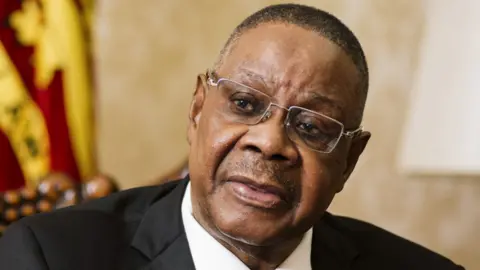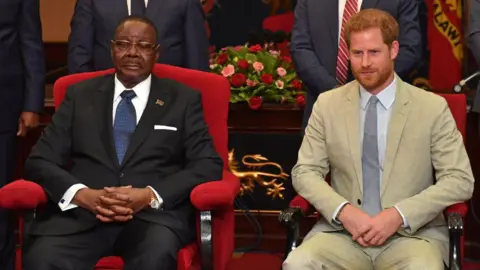 Bloomberg via Getty Images
Bloomberg via Getty ImagesJust five years after being dramatically unseated by a court ruling, Peter Mutharika is set to return to power as the president of Malawi.
Mutharika, who held the top job from 2014 to 2020, seems to have triumphed in last week’s general election, usurping his long-time rival, President Lazarus Chakwera.
Mutharika told voters on the campaign trail that life was simply better under him – Malawi has experienced one of its worst ever economic downturns since Chakwera took office.
But the record of 85-year-old Mutharika has its own blemishes, from corruption allegations to the debacle that ended his first presidency.
This is the fourth time he has run for office, but initially, Mutharika did not intend to go into politics.
Born in 1940 in the tea-growing region of Thyolo, he was raised by two teachers and developed a love for education.
“I grew up in a family where my parents were educators, and myself I spent all my life in higher education, at seven universities on three continents,” Mutharika commented in 2017, during an address at the UK’s Oxford University.
He attended Dedza Secondary School, an institution in central Malawi known for nurturing notable politicians, and studied law in the 1960s at the prestigious Yale University in the US.
Mutharika went on to become a professor, building an expertise in international justice. He spent decades away from Malawi teaching at universities in the US, Tanzania, Uganda and Ethiopia.
Mutharika eventually pivoted to politics in 2004, when his older brother, Bingu, became Malawi’s president.
Mutharika returned home to serve as an adviser to the new president and in 2009, he was elected as an MP for the ruling Democratic Progressive Party (DPP).
He served in his brother’s cabinet as justice minister, education minister and then foreign minister.
 WireImage via Getty Images
WireImage via Getty ImagesMutharika scaled the heights of power relatively peacefully, but tensions emerged in 2010, amid reports that Bingu planned to name his brother as the DPP’s presidential candidate for the 2014 elections.
“Every week, chiefs from all over the country are paraded on national television to sing praises of Peter Mutharika… Many of the public are outraged, considering this blatant nepotism,” Malawian journalist Francis Chuma wrote in The Guardian.
But the succession plans were abruptly interrupted in April 2012.
At the age of 78, the president suffered a cardiac arrest, and died. Mutharika paid a glowing tribute to the late leader at his funeral, describing him as “my brother, my friend and also my hero”.
With the presidency vacant, a power struggle ensued. Malawi’s constitution stipulated that if the head of state dies in office, the vice-president takes over, but Bingu had fallen out with his vice-president, Joyce Banda, over the controversial plans to install his brother.
The DPP had expelled Banda, who subsequently formed a new party, the People’s Party (PP), but refused to step down as vice-president.
When the president died, his supporters tried to install Mutharika as leader in defiance of the constitution, but ultimately Banda prevailed and became Malawi’s first female president.
Mutharika was charged with treason after being accused of being part of a plot to hide his brother’s death to give him time to manoeuvre to keep Banda out of the presidency.
He dismissed the charges as frivolous and politically motivated – and they were dropped after he was elected president in 2014, defeating Banda and Chakwera with just over 36% of the vote.
Mutharika’s supporters say his first stint in power uplifted Malawi, pointing to the billions of dollars of Chinese loans he secured in order to revamp the country’s infrastructure.
Inflation also dropped significantly during Mutharika’s first term. When he succeeded Banda, the inflation rate was at 24% percent – by the time he left, it had shrunk to single digits.
But Mutharika’s tenure also saw blackouts, food shortages and more of the corruption scandals that have long plagued Malawian politics.
In 2018, Malawi’s anti-corruption agency accused Mutharika of receiving a kickback from a 2.8bn kwacha ($1.6m; £1.2m) contract to supply food to the police.
Malawians took to the streets to protest but he was later cleared of any wrongdoing.
He has regularly defended himself as a proponent of the fight against corruption and extravagance, telling the BBC in 2015 that he was “the only president in Africa that travels commercial”.
Although Mutharika weathered the corruption allegations, he ended up losing the presidency in one of the most dramatic moments in Malawi’s political history.
Mutharika ran for a second term in 2019 and after the votes were counted, he was declared the victor.
However, the Constitutional Court later annulled the election, saying there had been widespread tampering, including the use of Tipp-Ex correction fluid on results sheets. Commentators mockingly referred to Mutharika as the “Tipp-Ex” president.
Judges ordered a re-run for 2020 and, astonishingly, Chakwera won with 59% of the vote.
Although Mutharika branded the re-run “unacceptable”, the Constitutional Court gained international acclaim for safeguarding democracy and refusing to be influenced by presidential power.
 AFP via Getty Images
AFP via Getty ImagesHe suggested he would not run for office again, but surprised many by entering this year’s presidential race, saying his supporters wanted him to save the country from Chakwera.
Since Mutharika left office, inflation has soared past 30%. Cyclone Freddy, a punishing drought, dwindling foreign reserves and other factors have pushed many Malawians into extreme poverty.
During campaign speeches this year, Mutharika asked the public in the local Chichewa language: “Munandisowa eti? Mwakhaula eti? (You miss me right? You have suffered, right?)”.
But Mutharika was rarely seen in public during the campaign, in contrast to Chakwera who held numerous rallies across Malawi.
As a result, speculation about Mutharika’s health is rife and there are questions about whether he has the stamina to lead Malawi again at the age of 85.
Regardless, voters have put their trust in him. He even triumphed in areas known to be Chakwera strongholds, such as the capital, Lilongwe, and Nkhotakota.
While his political career has been eventful, Mutharika’s personal life is relatively quiet. The AFP news agency describes him as “reserved” while South Africa’s Mail & Guardian wrote that “friends say he is a studious man, more at ease with books than political rallies”.
Mutharika has three children from his first wife Christophine, who died in 1990. In June 2014, he married former DPP parliamentarian Gertrude Maseko.
The couple are set to return to the presidential residence, but this time Mutharika’s in-tray will be far weightier.
Many Malawians have indeed suffered, as Mutharika noted in his campaign speeches. So once the dust from his unlikely comeback settles, the nation will be watching, keenly, to see if he makes good on his pledge to take them back to better times.
More about Malawi from the BBC:
 Getty Images/BBC
Getty Images/BBC
